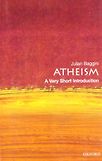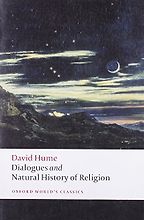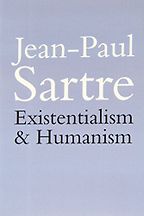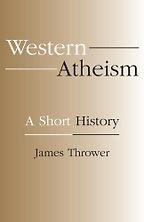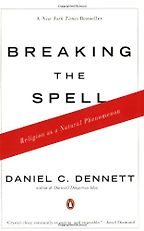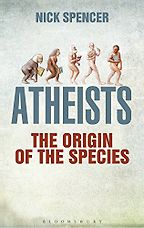What do you understand by atheism?
That’s not as easy a question as you might think. Atheism, on the face of it, seems straightforward: it’s not theism. It’s a belief that there is no God or gods. But it’s slightly more complicated than that because, for most self-identifying atheists, it’s not just that they don’t believe in a God or gods, but that they don’t believe in any kind of supernatural realm. So I think an atheist is, 95% of the time, a naturalist. Atheists believe that whatever may be in the universe, the only kind of stuff is the stuff of physics, and the only fundamental forces are those of physics.
So atheism isn’t defined against religion so much as for a particular kind of physics-based explanation of the universe?
That’s right. It’s a big myth about atheism that it’s parasitic on what it denies. People say ‘Look, it’s even in the name itself: ‘a-theism’’. But that’s just historical accident. It just so happens that western civilisation has, for many centuries, been predominantly religious, and so the alternative worldview ended up being defined in contrast to that. I always say, if people say that atheism is parasitic on religion, ‘What would happen if no one believed in God any more? Would that mean there were no atheists?’ Of course not. It would mean that everyone would be an atheist and perhaps, in that situation, there wouldn’t be a special name for it, because there would be no need.
You might still want to distinguish it from agnosticism. Some agnostics make the bold claim that atheists, if they’re rational at all, must be agnostics really, because there isn’t sufficient proof to warrant being an atheist.
That’s extremely misleading because that argument works on the assumption that to be an atheist implies an absolute certainty, that there is no possible doubt you could be wrong. People rightly say that’s unjustified because you can’t know for sure there’s no God with our limited experience, and so on. That’s rather asymmetric for a start. There are plenty of people who have a belief in theism who would deny that they’re absolute about it, and they maintain some doubt. Bertrand Russell said something along the lines that, in a technical sense, he was an agnostic, because he couldn’t know for sure that God didn’t exist — but that to label him agnostic would be profoundly misleading because the hypothesis of God is one he doesn’t take to be a real possibility, and plays no influence in his life.
“Atheism is not something that defines your every moment of existence. I don’t wake up in the morning reminding myself that I don’t believe in God.”
I think an agnostic is someone who is really just unsure, someone who can’t make up his or her mind whether they believe God exists or not. An atheist is someone who has a pretty settled view that there is no God, but within that, there’s a spectrum of people who are absolutely convinced, and those who simply think that the balance of evidence is strong enough that they don’t want to sit on the fence, but beyond that, they’re not going to claim any absolute certainty.
You’ve written a book about atheism, you’ve spoken about atheism, you’re involved with the British Humanist Association. Do you read widely in the literature of atheism?
To be honest, I don’t, and in some ways I’m always quite surprised that a lot of atheists do. If you’re pretty convinced of this position, then why would you want to read every new book that comes along telling you you’re right? It does seem to be a strange kind of desire for reinforcement. Like a lot of people, my biography of belief is a bit complicated. As a child, I was religious by default, and then religious by conviction, and then I came to atheism. But after a while, when you’ve thought through the issues, and you’ve decided that’s where you stand, you don’t close your mind. You want to go on and think about other things.
“Like a lot of people, my biography of belief is a bit complicated.”
Atheism is not something that defines your every moment of existence. I don’t wake up in the morning reminding myself that I don’t believe in God. I’m actually quite limited in what I read about atheism, and most of what I do read will be for reviewing purposes, or because something comes along which is particularly interesting, or relevant, or looks like it’s going to be new. The vast majority of books that come out about atheism are either polemical or introductory. Everybody has their own individual take, but most of that is likely to be extremely familiar.
I hope, despite that, or maybe because of it, you’ve been able to pick out five books that aren’t tedious, repetitive, or obvious.
I think so. I hope so.
What’s the first one?
Contemporary modern western atheism really starts, intellectually, with David Hume. He’s an interesting figure. Some people deny he was an atheist because he never came out with any statements which were unambiguous on that. They would categorise him as an agnostic. Others say that’s simply because, at the time he was writing, it was too dangerous to be open about atheism: not dangerous for his life, but it would have made things difficult had he come out as an atheist. His Dialogues Concerning Natural Religion was published after his death, perhaps for that reason. I found to my frustration that Hume’s writing on religion wasn’t available in a single volume. I’m afraid there’s a slight bit of self-plugging here, but I edited a volume of his work on religion, and that’s my first choice.
Hume is the main man. Hume is where I’d like to start. What’s so wonderful about Hume is that the very reason why some people are able to claim that he’s an agnostic rather an atheist, the whole reason there is a debate, is that he is extremely measured. He’s not one of these people who just gives a strong polemic against the insanity of religious belief: he looks at the arguments and the reasons for believing or not believing, soberly. There’s no grandstanding or histrionics about it.
There’s a sense in which he’s in dialogue with religious believers in much of his writing anyway. It’s religious writers who got him thinking in the first place.
That’s right. A lot of it is responding to the kind of arguments that were very common in his time, and actually, surprisingly, endure today: arguments that there must be a ‘First Cause,’ or that the order and design that we see in the universe must indicate some designer behind it, or that reports of miracles provide good evidence for God’s existence. He was responding to the more intellectual defences of religion that were around in his time. He picks these apart extremely effectively. It’s a good example, actually, of how you don’t need to be aggressive, and you don’t need to insult in any personal way the people you disagree with, in order to dismantle their position. Hume is much more devastating, in his way, than most of the new atheists are.
He was also a brilliantly witty writer, and used elaborate thought experiments to make his point. Is that an aspect of his writing that appeals to you?
It’s an interesting question whether he’s a good writer or not. I’ve always thought him a good writer, but I know some people read Hume and find him difficult. It’s partly just a question of period style. He does tend to write in very long sentences. I think that was just the typical writing of the time. In the 18th century people put a lot of commas and semicolons in, and there weren’t so many full stops. Present day readers can find that quite awkward.
I think it’s definitely worth trying to overcome the 18th century prose style and recognise just how brilliant he was, particularly in the Dialogues Concerning Natural Religion, that posthumous book, where he went out of his way to put strong arguments in the voices of different characters. It wasn’t a straightforward knockdown critique of the ‘Argument from Design’ and the various other arguments used—although that is there within the book too—but rather there’s a sense in which you’re taken through the process of thinking by hearing good arguments on both sides from different characters in dialogue with each other.
That’s right. This makes his dialogues far superior even to Plato’s. The Platonic dialogues can be stylistically grating because it seems that anyone who is forced into conversation with Socrates is just there to be shown how wrong they are. Most of the time, people are just saying ‘Yes, Socrates, I agree, Socrates,’ or they’re falling straight into his traps. In Hume’s Dialogues, you get very strong versions of the arguments on both sides. If you were to read the Dialogues—without knowing in advance which side Hume was on—there are certainly places where you wouldn’t be sure whether or not this book was ultimately going to be a defence of religion. Remember that it only takes one good argument to prove God’s existence. You could dismiss several arguments as insufficient to establish that, and still conclude with one that was good enough. [Spoiler alert: he leaves all the traditional arguments for God’s existence in tatters].
Hume’s major theme is one which applies to most good atheistic writing, which is that you should proportion your belief to the available evidence, going beyond that is unreasonable.
That’s absolutely Hume’s principle. I don’t want to summarise it and make it too crude, but what he’s really showing is that none of the reasons people have to suppose that there is a God, is strong enough to establish any such thing. So what you’re left with is the position where you don’t have sufficient grounds to believe. Now, that doesn’t mean you’ve proved there is no such thing, but in the absence of good grounds to believe that something exists, then your default position is to assume that it doesn’t until proven otherwise. People often say, ‘You can’t prove a negative’ — that you can’t prove that God doesn’t exist, and therefore that’s another reason why you can’t be an atheist. That’s a misunderstanding of the ‘can’t prove a negative principle.’ We understand in all normal circumstances that to believe that something exists in the absence of any good reason that it does exist is irrational. They get it the wrong way round. It’s not that you need to prove that something doesn’t exist. It’s rather that if you show there’s an absence of reasons to think it does exist, then you have no use for that hypothesis.
I’ve never understood the idea that you can’t prove a negative. I can say there’s nothing in my pocket, and then I open my pocket up and pull it inside out, and lo and behold, there’s nothing there. I conclude a negative.
I agree with you. It’s a much misunderstood principle. I suppose the point is that there are circumstances when it’s impossible to do all the checking necessary to establish the negative. So if we’re going to prove, let’s say, that the Ark of the Covenant isn’t buried somewhere under the sand of the Sahara Desert, it’s impossible to prove that.
It’s impractical, it’s not impossible. You could dig up the whole of the Sahara and then when you don’t find it—as with a famous case of weapons of mass destruction—draw your conclusion.
The Sahara’s too big, so for those practical reasons you can’t. But you’re right, when it’s a small enough area to look in—a pocket say—it’s easy to establish a negative. It’s easy to establish that there’s no elephant in your fridge, and if you end up saying there might be an invisible and intangible elephant, then you’re being silly. Now, there are so many different definitions and understandings of what God is, that there’s always room to turn round and say, ‘Well, it’s true that you haven’t established the existence of God, we can’t prove it, but there are plenty of places that God could be hiding.’ From that point of view, you can’t get the decisive argument.
“Without God, there’s nothing to fall back on as an authority, nothing to tell us what the right way to live is.”
You have to go back, again, to that Humean principle of proportioning your belief to the evidence, and think about the right kind of evidence for what it is you’re looking for. If you believe some divine, benevolent ruler of the universe exists, there are certain things you’d expect to follow from that. There are certain things you might expect to see in the universe if that were true. Then, when you find that those things don’t obtain, it’s reasonable to conclude that it probably doesn’t exist. The fact that it doesn’t prove it 100% is a huge red herring because there are so many things the existence of which you can’t prove with absolute certainty. You have to live and make your choices on the basis of what seems most probable.
And, as you pointed out earlier, somebody who has a concept of faith allows an element of doubt, otherwise there would be no room for faith. So why shouldn’t an atheist have some room for doubt, as much as a theist? But let’s go on to the second book, because that involves faith as well, in a sense. It’s not usually thought of as a classic of atheism, though it could be read in that light. The book is Existentialism and Humanism by Jean-Paul Sartre. This was originally a lecture delivered in post-war Paris to a packed lecture theatre. The literal translation of Sartre’s title was ‘Existentialism is a Humanism’. Could you tell us something about why you chose this book?
Serious Sartreans get quite annoyed with this book because it’s a very accessible, easy-to-read, non-technical, public lecture. Many Sartreans think that unless you’ve read Being and Nothingness from cover to cover and pored over the footnotes, you don’t really understand Sartre. For them, people like me who say, ‘I like Sartre, I like Existentialism and Humanism’ are a bit like people who say ‘I really like Wagner, that ‘Ride of the Valkyries’ is a great tune,’ but have never sat through the Ring Cycle. Let’s put that aside, because it is a great essay, irrespective of how representative of his thought it is. The reason I wanted to include it is that in contemporary Britain, atheists and humanist organisations are keen to stress the cheerful side of atheism. The British Humanist Association, like other humanist associations worldwide, uses a happy human symbol. There’s this idea that because so many people have this misconception that life without God is dark, meaningless and without purpose, you’ve got to emphasise the extent to which joy, happiness, meaning, and morality are possible without a belief in God. Of course I do think that’s true, but there’s also a danger of overstating it.
Get the weekly Five Books newsletter
What you see in Sartre represents that tradition in thought pointing to troubling aspects of accepting a world without God. There are difficulties involved. Primarily, it’s this issue around responsibility. Without God, there’s nothing to fall back on as an authority, nothing to tell us what the right way to live is, or what the correct moral code is, nothing to show us what makes life meaningful. We really do have to make that decision for ourselves. That profound responsibility generates anxiety, anguish and despair, Sartre says. I find this absence more comical than tragic — though it has its tragic side.
You see the same basic, existentialist ideas in the Monty Python films, and the appropriate responses there are not anguish, abandonment and despair, but ironic humour. Life is absurd, so you laugh. That seems about right. Whereas for Sartre, life is absurd, and therefore you go ‘oh my (non-existent) God’ and put your head in your hands. It is important to bear in mind that there are difficulties, there are problems, and for all that I agree that meaning and value are possible without God, the thought that this is all there is—and everything that matters to us is going to be extinguished, and in a moment I could die, and nothing would be left behind, and everything I worked for would just disappear, from my point of view—is a disturbing thought.
There’s more there in the anguish than simply psychological disturbance. In Existentialism and Humanism Sartre says the anguish is the anguish of choosing, as if the whole world were watching you. ‘In fashioning myself, I fashion man’ or ‘humanity.’ There’s a sense in which you move from your particular subjective choice to creating a vision of what is right for your epoch.
Yes. I realise I’ve included this book even though there is very little in it I agree with 100 per cent. On that point, and many others here and elsewhere, he overstates it. I don’t think when you choose for yourself, you choose for all humankind. I suppose what he means is that when you choose for yourself, you endorse something as at least in the possible range for all of the rest of mankind, unless you’re making a complete exception of yourself. So there is a claim to universality there implied by choice. Now, of course, most of the time the rest of the world isn’t even going to notice, so that doesn’t really matter. But I think it is true— and this is where, perhaps, you get some moral seriousness in an atheistic world view that some people claim to be lacking—that simply by virtue of the need for consistency your choices inevitably express values which go beyond your own preferences. So, for example, if someone tucks into a factory-farmed pig, they’re implying that this is acceptable, that it’s all right that we live in a society where animal welfare is given so little respect.
At the heart of Sartre’s lecture is a real-life example that Sartre retells of a student who came to him in wartime, in occupied Paris, with a genuine dilemma of whether to stay to look after his mother and protect her, or to join the resistance, the Free French, and fight the Nazis to save his country.
That’s right. The student wants an answer, and Sartre doesn’t give it to him. Sartre says, basically, you have to make up your own mind, and what he’s trying to get over to the student is that he can’t abdicate his own responsibility by choosing any kind of authority. What’s interesting about that is—although I’ve chosen it as an atheist book—is that I actually think Sartre overstates the importance of the absence of God for existentialism, because that same point about that difficulty of choice and responsibility you get before Sartre in Kierkegaard. Kierkegaard, in his Fear and Trembling, talks about Abraham’s decision, about whether or not he’s going to go ahead with the sacrifice of his son Isaac, as requested by God. Now, why should this be troubling? Some people say you do what God tells you to do. But in Kierkegaard’s telling, even if you believe in God, and even if you believe that God has command, ultimately, you’re the only person responsible for your decision. So, as far as Abraham is concerned, is God trying to test him? Woody Allen does a good skit on this, where God is very cross with Abraham for going ahead with the sacrifice, and Abraham protests, ‘Well, I’m just showing how obedient I am, God.’ God replies, ‘No, what you’re showing is you’ve got no moral fibre, and that if someone tells you to do something in a booming, modulating voice, then you’ll do anything.’ That’s actually a really important point.
Well, Kierkegaard was the inspiration for Sartre: he mentions Kierkegaard’s notion of the anguish of Abraham. It’s there in the backstory of how he came to his ideas in Existentialism and Humanism.
Absolutely. It seems a bit odd for me in the text that, at points, he suggests that the crucial thing for existentialism is that it takes seriously the idea that there is no God, but much of what he actually says doesn’t depend on that at all. Even if you have a religious belief, you may still have this issue.
Another aspect of that lecture which touches on a subject you’ve written about is that Sartre certainly overstates the degree to which human beings have freedom, have free will, have choice over their lives. I love the book in that it inspires people to go and do something, and not be in what he calls ‘bad faith,’ the kind of self-deception where you deny your own freedom. But he talks, sometimes, as if you could wish yourself into any kind of existence.
Certainly at this point in his career, he did overestimate the extent to which we are free to do what we want. As I understand it, Simone de Beauvoir had a more realistic view of human freedom, coming at this from the perspective of a woman of her time. She saw that in order to realise their potential freedom, many women had to have the shackles of patriarchy removed, and some women themselves didn’t realise their own capabilities, because they were so acculturated to believe that they had to fulfil certain roles.
That is all consistent with Sartre’s belief that we take on social roles, and, the way we behave in those roles makes it looks as if we are not genuinely free, but actually that is a kind of self-deception. Yes, but for Sartre it’s always just a question of self-deception.
I think a more realistic view is that it’s unrealistic to expect people to be able to release themselves purely by force of their own will. You need other people or social structures to be different in order for you to really realise this. Then, even once you’re beyond that, once you’re seeing things as clearly as possible, there are huge constraints on our choices. He doesn’t really take those constraints seriously, in Existentialism and Humanism at least, and as I understand it this is something perhaps he did struggle with more in his later work, but I’m afraid I’m not the one to tell you exactly how he resolved the issue.
Your next book is one I’ve not come across before, James Thrower’s Western Atheism: A Short History.
I brought this book in because when I was writing my book on atheism, Atheism: A Very Short Introduction, I was looking for some history. There was very little written about that. It may be a little bit different now, but this was the only decent book that I could find. It looks at atheism and its precursors in different periods: the pre-Socratic period, the Hellenistic period, and then going up to the Renaissance and Middle Ages. I’m not one of these people who can retain much memory of books, I don’t remember a lot of facts from them. I know from talking to others that a lot of people are like this. Most of them are a bit embarrassed about it, and don’t like to admit it. We all assume that other people are much better retainers of what they’ve read than we are ourselves. But what I do get from books, apart from information, is this: a good book changes the way I think in some way. I may not remember exactly what detail of the book did that, I may even misremember details of the book, but if it changes how I think, and informs my views, then it’s done something worthwhile.
Five Books interviews are expensive to produce. If you're enjoying this interview, please support us by donating a small amount.
Thrower’s book changed my view of the history of atheism in several ways. One was that it made clear to me that overt atheism is a reasonably recent phenomenon: it didn’t really emerge until quite late in the Middle Ages. There was a French priest, Jean Meslier—a play was written about his life a few years ago, quite an interesting one—and he’s held by some people to be the first overt atheist. He died in 1729. Baron d’Holbach is the other person who’s often claimed to be the first overt atheist. It’s quite striking, that you can’t unambiguously claim that anyone was ever atheist until that late, and interesting in itself.
Going back to Hellenistic periods, it does seem that most thinkers believed in a supernatural world. You read Plato’s Dialogues, and Plato often talks about the gods, and the oracles. Some people— because I think they want to believe that Plato was a paradigm of rationality—assume this was a sop to the masses, but many scholars, perhaps the majority, think that’s just not true. Plato did believe those things: everybody did. Again, some people believe that educated Romans, the Roman aristocracy, were at least agnostic about the gods, but thought it important that the masses believed in them for Machiavellian reasons. That sounds implausible. It’s curious that open atheism of the kind we recognise is so recent a phenomenon. But then, in other ways, perhaps it isn’t curious. Even Richard Dawkins has argued that before Darwin you could be an intellectually respectable religious believer. We simply didn’t understand enough about the way the world worked to be able to make sense of it without assuming some kind of supernatural agency. Atheism is only really something that becomes intellectually complete and robust at a time when you can understand the world with a high degree of scientific sophistication.
Your next book is by somebody who is inspired by Darwin in some aspects of his work, Daniel Dennett. The book you’ve chosen is called Breaking the Spell. What’s the spell?
It is the spell of religious belief. Broadly speaking, it is the spell of supernatural belief. The reason I wanted to include this was that we have had this recent phenomenon dubbed the New Atheism which is, of course, like all these labels, a label put upon people from the outside looking in, rather than a self-proclaimed one. The New Atheism has been a very interesting movement, but one which I’m, at the very least, ambivalent about. Of the so-called ‘four horsemen’ of the New Atheist apocalypse— Daniel Dennett, Richard Dawkins, Sam Harris, and Christopher Hitchens—Dennett is far and away the most sober, rational, and fair-minded of them. If people want to read a New Atheist book, they should read this one. That would be a good way of trying to counter some of those myths that contemporary atheists are all just very cross, angry, and belligerent.
A common complaint against the New Atheists is that they caricature religion and so are attacking a straw man.
This is a charge often levelled at Richard Dawkins: the criticism that his target is a view of God as an old man in the sky, pulling the levers, controlling the weather and so on — that he fails to appreciate that there are many more subtle ways of understanding what God is. Dawkins’s answer is that he doesn’t need to attack more sophisticated views, because the inventions of Oxbridge theologians bear no relation to what most people think. Dennett, in contrast, is much more sympathetic and understanding about different views of religion and the nature of God. What he’s trying to do is delve beneath the reasons people give for their beliefs, and try and understand them in a way that makes sense of them as a natural phenomenon. That doesn’t make them true, of course, he doesn’t believe there is a God. But he tries to understand why religious belief is so prevalent, and to diagnose its causes.
Your last book plays on the title of Darwin’s most famous book…
Yes, it’s Nick Spencer’s Atheists: the Origin of the Species. I did want to include a book which was more critical of atheism, because reading lots of books that bolster your own worldview isn’t a very interesting way of going about things. Often the most interesting books are those which challenge your position intelligently. They’re in rather short supply, I have to say. There are books which counter the more belligerent forms of atheism straightforwardly, and others I find quite contentious. I like this one. I don’t agree with its conclusions, but Spencer is quite good at not overstating things. He raises some important questions. A lot of people have tried to explain the rise of science itself, and indeed, the worldview that it gives rise to, as deeply rooted in religion. Religion played a huge role in the Scientific Revolution: it wasn’t simply the thing that was blown away by it. I think that’s fair and true, but it doesn’t follow from that that religion should still stand at the end of it.
So is this book a polemic against atheism?
It is an anti-atheist book. He does point out that there are various atheisms, and that’s one reason why it’s a more interesting book than many others, which talk about atheism in the singular. Just as we know there are many ways of being religious, there are many ways of being an atheist. Ultimately, Spencer thinks it is a dead end, that religion will come back and will dominate. Obviously I don’t find those arguments ultimately convincing, so I can’t end up recommending this book on the grounds that I agree with its conclusions or its arguments. But I do think that it presents challenges and arguments which deserve a response.
“In some ways, becoming an atheist doesn’t necessarily change things as much as you might think.”
So often I find that when people make criticisms of atheist positions, all you can do is point out the fundamental misunderstandings that they have of atheism, or the rather simplistic fallacies that their argument relies on. Whereas, when Spencer makes a point about atheism, nine times out of ten it’s something that there is a response to, but it’s not so obvious, you have to think and to engage with what he’s written. He maintains that ‘the history of atheism is best seen as a series of disagreements about authority, rather than primarily about the existence, or otherwise, of God.’ His point is that to look at, for example, the French Revolution, and to see it as fundamentally a theological or philosophical dispute about whether God exists or not, is hugely misleading, because it was really a question about power and authority, and where it lies. There’s a great deal of truth in that, and it would be useful to look at that, but at the same time, it’s not an either-or. That’s the fundamental point. So it’s true, you can see how the development of atheism did include such power struggles, and they were very important. But behind all this, there are still claims about whether God exists or not, and arguments about whether God exists or not. He adds another dimension to the debate, and enriches it, but doesn’t ultimately change the final conclusions.
One final question. Atheism involves a philosophical belief, but presumably it also changes how you live. When you become an atheist, it’s not just that you change what you expect for the future, you must surely live differently as a result. On a personal level, when you became an atheist, did you change how you lived?
That a good question, because, in some ways, becoming an atheist doesn’t necessarily change things as much as you might think. It depends partly on what kind of religiosity you escaped from. A very common experience people have is that when they come from a very moralistic, puritanical, strict religious background, they have all sorts of fears, hang ups, and repressions around sexuality. Giving up the religious belief frees them in their sexuality, in some way. That doesn’t mean they go from being chaste virgins to libertines necessarily—although sometimes this is what happens—but nevertheless there is a fundamental change there. That’s not something that was a particularly important factor for me. There was no big overnight change. But there was a gradual shift to seeing the value, and meaning, and purpose in the here and now. By the here and now, I don’t mean the shallow sense of right this minute, right this second, what can I have now, now, now, but the deep-rooted belief that death is the end, and that the awareness that life is all we have nurtures an appreciation of life and the world. That can become a shallow kind of hedonism where you’re just grabbing after the next experience, but it doesn’t have to. It can produce a richer sensitivity to people and things around us. It’s not an overnight transformation, but the journey that I have taken, and in which atheism has definitely played a large part, is one in which I try to have a greater sensitivity to the importance of the here and now, not in a selfish way.
Issues of social justice, inequality and fairness have become more important. When refugees wash up dead on the shores of Europe, you can’t have that reassurance in the back of your mind that they’ve now entered the bosom of their creator, and everything is going to be all right. Far from it: theirs were lives that were hard, and difficult, and were ended prematurely. All we can do is try and stop other people having to live and die in that way in the future. A greater appreciation of life is one result of atheism. Although that sounds very positive, it does make life bittersweet, because you know everything is passing, and nothing’s ever permanent. There’s an awareness of the coming dusk, always there, while we appreciate the sunshine.
Five Books aims to keep its book recommendations and interviews up to date. If you are the interviewee and would like to update your choice of books (or even just what you say about them) please email us at [email protected]

